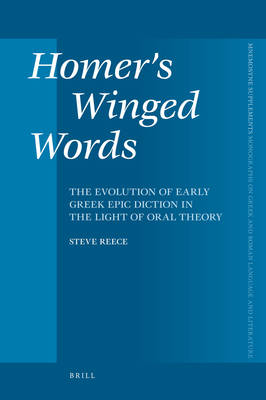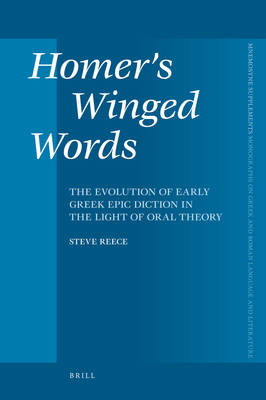
- Afhalen na 1 uur in een winkel met voorraad
- Gratis thuislevering in België vanaf € 30
- Ruim aanbod met 7 miljoen producten
- Afhalen na 1 uur in een winkel met voorraad
- Gratis thuislevering in België vanaf € 30
- Ruim aanbod met 7 miljoen producten
Zoeken
Homer's Winged Words
The Evolution of Early Greek Epic Diction in the Light of Oral Theory
Steve Reece
€ 406,45
+ 812 punten
Omschrijving
For over 2500 years many of the most learned scholars of the Greek language have concerned themselves with the topic of etymology. The most productive source of difficult, even inexplicable, words was Homer's 28,000 verses of epic poetry. Steve Reece proposes an approach to elucidating the meanings of some of these difficult words that finds its inspiration primarily in Milman Parry's oral-formulaic theory. He proposes that during the long period of oral transmission acoustic uncertainties, especially regarding word boundaries, were continually occurring: a bard uttered one collocation of words, but his audience thought it heard another. The consequent resegmentation of words and phrases is the probable cause of some of the etymologically inexplicable words in our Homeric texts.
Specificaties
Betrokkenen
- Auteur(s):
- Uitgeverij:
Inhoud
- Aantal bladzijden:
- 413
- Taal:
- Engels
- Reeks:
- Reeksnummer:
- nr. 313
Eigenschappen
- Productcode (EAN):
- 9789004174412
- Verschijningsdatum:
- 20/05/2009
- Uitvoering:
- Hardcover
- Formaat:
- Genaaid
- Afmetingen:
- 165 mm x 244 mm
- Gewicht:
- 816 g

Alleen bij Standaard Boekhandel
+ 812 punten op je klantenkaart van Standaard Boekhandel
Beoordelingen
We publiceren alleen reviews die voldoen aan de voorwaarden voor reviews. Bekijk onze voorwaarden voor reviews.








